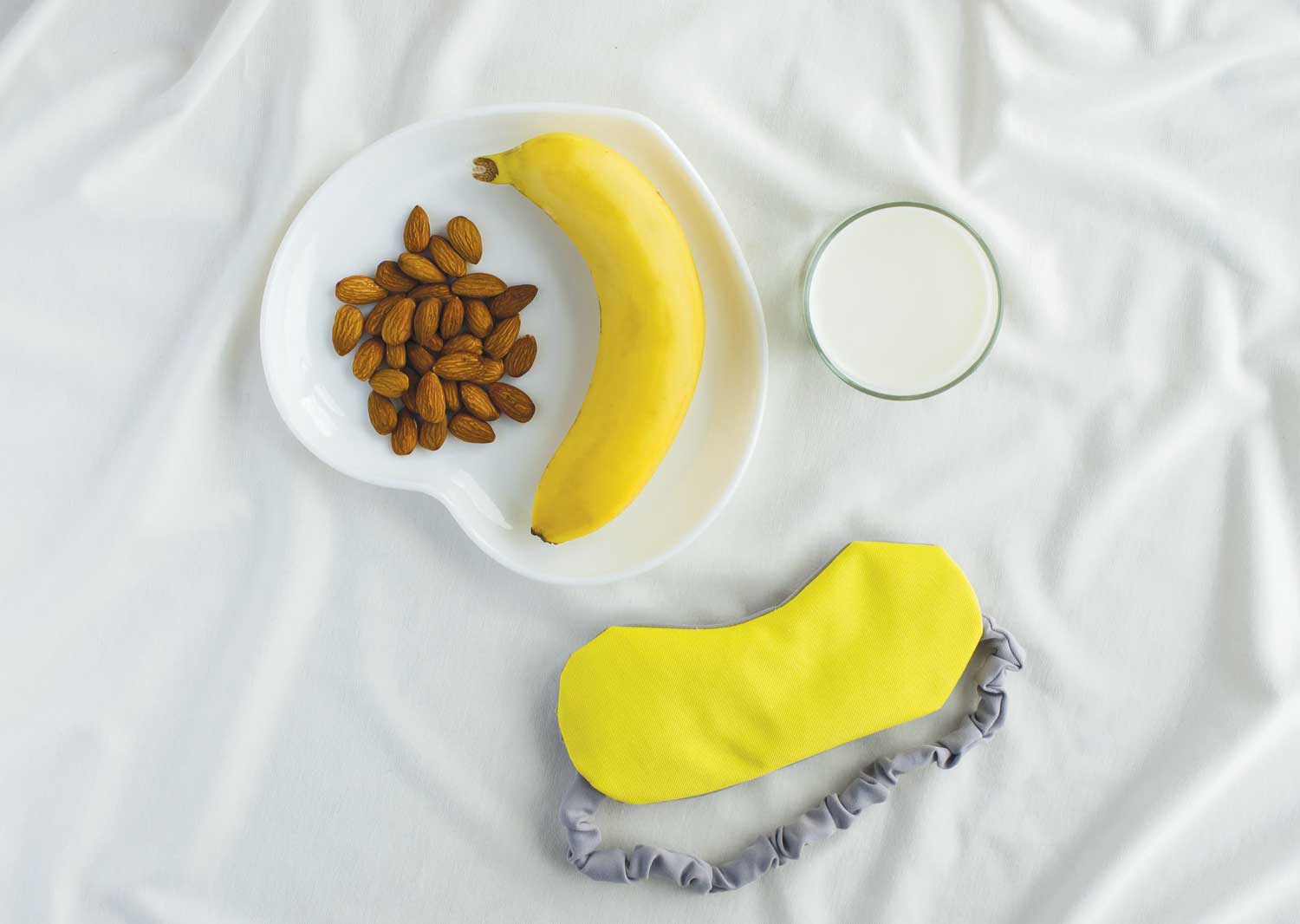Foods for a Better Night’s Sleep
“EATING A HIGH-CARBOHYDRATE DIET REDUCES SLEEP QUALITY, WHEREAS A DIET HIGH IN FIBER IS ASSOCIATED WITH BETTER SLEEP QUALITY.”
It goes without saying that the foods we eat directly impact our health. While our daily diet tends to lean toward foods that nourish, energize, and sustain us during the day, we don’t often think about the impact they can have on our bodies at night when it comes time to rest and recharge.
As far as foods to avoid before bed, some are commonly known.
“Food intolerances can interfere with sleep, especially those that cause digestive discomfort like spicy or highly seasoned foods that can make falling asleep more difficult,” says Caryn Alter, registered dietitian at Star and Barry Tobias Health Awareness Center, CentraState Medical Center in Freehold. “Caffeine should also be avoided before bed as it’s a stimulant, and is often found in beverages like coffee, tea, soda, and energy drinks, as well as foods like chocolate—and even in some medications,” she says, adding that these types of foods and beverages are best avoided from the afternoon onward to not interfere with sleep.
Those sensitive to caffeine should also consider avoiding decaf coffees and teas before bed as they’re not often 100 percent caffeine-free—some brands still contain trace amounts, and the amount of caffeine is not required to be listed on food labels.
Along with caffeinated beverages, alcohol should also be avoided before bed. “Though alcohol can cause drowsiness, hours later it can have a stimulant effect and disrupt the REM phase of sleep,” she says, adding that water is the better bet—though not right before bed.
“While adequate fluid intake can reduce fatigue and enhance relaxation, consuming too much liquid just before bedtime may result in waking up at night for trips to the bathroom,” says Alter.
“With this in mind, developing a better understanding of the dietary factors that directly impact sleep outcomes is important.”
Just as consuming healthier beverages in the evening is better for sleep, so is eating more nutritious foods throughout the day.
“Eating a high-carbohydrate diet reduces sleep quality [sleep quality refers to deeper sleep, more REM, and better sleep onset], whereas a diet high in fiber is associated with better sleep quality,” says Deborah Cohen, associate professor of clinical and preventative nutrition sciences at Rutgers University in New Brunswick.
THOUGH ALCOHOL CAN CAUSE DROWSINESS, HOURS LATER IT CAN HAVE A STIMULANT EFFECT AND DISRUPT THE REM PHASE OF SLEEP.
“Diets high in saturated fat are also associated with poor sleep quality because high-fat foods slow gastric emptying, which means these foods stay in the stomach longer than those which are lower in fat,” says Cohen. “This slower gastric emptying can contribute to GERD or heartburn, and the feeling of being full may make it more difficult for someone to fall asleep.”
Therefore, one should stick to not eating immediately before bed, and, if you do, choose foods with sleep-promoting properties.
“Foods high in omega-3 fatty acids (specifically docosahexaenoic acid or DHA) are great for sleep because they support brain health by helping to modulate brain neurotransmitters,” says Cohen, adding they can be found in foods like milk, tuna, cheese, nuts, and seeds.
Zinc, magnesium, and calcium also promote better sleep because they produce a sedative effect on the nervous system. They can be found in many of the foods we eat.
“Zinc can be found in pumpkin seeds, chia seeds, almonds, spinach, peanuts, and soy milk; magnesium-rich foods include whole grains, green leafy vegetables, as well as nuts and seeds; and good calcium sources include cheese, fortified orange juice (which contains fructose, a natural fruit sugar that will not cause a spike in blood sugar like sucrose), okra, green leafy vegetables (like kale), fortified plant milk, and cow milk,” says Cohen, adding that the old adage of drinking a warm glass of milk before bed has survived because it contains trace amounts of tryptophan, an essential amino acid known to enhance sleepiness.
What’s more, eating cherries can add to those sweet dreams.
“Cherries, especially tart cherries, may help promote sleep because they contain melatonin, a sleep-inducing hormone,” she says. “They also contain phytochemicals which help reduce stress and tension.”
So before getting tucked into bed, get tuckered out by adding these foods into your diet to help support your nighttime routine.

HEALTHY SNACKS FOR BETTER SLEEP
Courtesy of Deborah Cohen, associate professor of the Department of Clinical and Preventative Nutrition Sciences at Rutgers University, School of Health Professions, New Brunswick.
Have the late-night munchies? Here are a few snacks that are both healthy and conducive to a good night’s snooze. Remember: Go for a smaller, lower-calorie portion size so you’re not going to bed on a full stomach.
- Plain or vanilla yogurt mixed with chopped walnuts or pumpkin seeds, with chopped pitted tart cherries
- Turkey mini sandwich: 2 ounces of roasted turkey, raw spinach, and 1 slice of whole-grain bread, cut in half and brushed with about 1 teaspoon of mayo or olive oil.
- 1 ounce of low-fat cheese, like part-skim mozzarella, goat, feta, or Parmesan, on whole-grain crackers.
- Fruit bowl made with sliced bananas, diced pineapple, and sliced apples (or cherries).
- Banana topped with 1 tablespoon almond butter.





